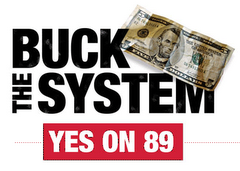Why we need Proposition 89
The biggest story about this year's Dash for Cash during the final days of the legislative session has been the new practice of "pledging" donations to dodge campaign finance disclosure. Proposition 89 would fix this loophole because politicians would be no longer beholden to big money special interests, so there would be no need to conceal donations until after the bills are voted on.
Despite the money hidden by pledging, the volume of contributions as lawmakers are voting on bills is staggering. The practice of "pledging" is to avoid stories like Dan Moran's must-read article in today's Los Angeles Times that examines situation in Sacramento:
Checks Roll In as Laws Flow OutIt is unfortunate for our state that more and more people are reading these stories on the big money domination of our government and getting fed up to the point that they quit caring. That harms our democracy and only makes the special interests more powerful. One of the results in the states that have clean money is that it restores faith in democracy and increases citizen participation. If you look at the trend, you will see the critical need for passing Proposition 89, because things are getting worse every year:
As legislators vote on hundreds of bills before their session ends, special interests affected by the measures donate thousands of dollars.
SACRAMENTO — Entertainment companies seeking a tax break, Staples Center owners hoping for a change in labor law, an ersatz Indian tribe angling for a casino: All are among the scores of donors writing checks to lawmakers in the final days of the legislative session.
As those lawmakers cast final votes on hundreds of bills, moneyed interests directly affected by them are contributing hundreds of thousands of dollars.
On Monday, the start of the final four days of the legislative session when 600 bills were awaiting action, interest groups donated at least $193,000, according to information filed with the secretary of state's office and posted on its website.
Insurance companies, rental car firms and major pharmaceutical makers were among the donors whose four-figure checks arrived Monday, as legislators were voting on bills that could mean millions in profits or losses in years to come.
"The whole thing has turned into an almost 24-7 crazy, obsessive system," said attorney Barry Broad, a longtime Capitol lobbyist for the Teamsters union. "All this money is corrosive. It is eating away at the credibility of democratic government."
On two days last week, legislative incumbents and candidates held a combined 33 fundraisers. On Aug. 16, legislators and candidates held no fewer than 25 fundraisers in the vicinity of the Capitol, according to invitations to the events compiled by the Capitol Morning Report newsletter.It is time to return government to the people, we need to pass Proposition 89!
Interest groups gave at least $3.5 million, in contributions of $1,000 or more, directly to candidates for Senate and Assembly seats in the first 29 days of August. State law generally caps individual donations to legislators at $3,300.
The last time lawmakers faced a general election as they wrapped up a session was August 2004, when they raised $3.2 million, according to the secretary of state's records. In August 2002, senators, assembly members and others running for legislative seats raised $2.1 million or more, according to the secretary of state's campaign finance records. [...]
Many veteran lobbyists and former legislators, speaking privately for fear of alienating sitting members, are convinced that legislators have become more brazen in their requests for money.


